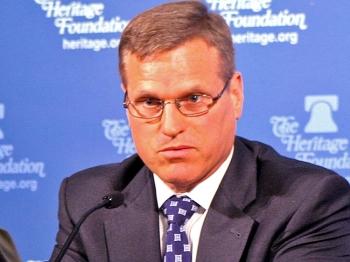WASHINGTON—No one likes to see a child go hungry, but in the case of the North Korea regime, it is never a simple matter of providing food. In the mid-1990s, as many as 1 million North Koreans died in one of the worst famines of the twentieth century. Today, organizations allowed inside North Korea warn that the “hermit kingdom” is again on the brink of a severe food shortage crisis.
The United Nations World Food Program (WFP) and Food and Agriculture Organization (FAO) say that some 6 million people, or a quarter of the population, suffer from malnutrition.
North Korea, one of the most closed and oppressive regimes in the world, has appealed to the world for food aid. The WFP, the FAO, and various non-governmental organizations are calling on the international community to help with at least 434,000 metric tons (478,000 tons) of food.
The United States and South Korea are currently considering whether or not to respond to the request, and appear close to agreeing.
Stephen W. Bosworth, U.S. Special Representative for North Korea Policy, was in Seoul on May 17 to discuss the issue with his South Korean counterpart, Ambassador Wi Sung-lac.
“We had a good discussion today on the North Korean request for food assistance, and I think we have largely reached a common view on that. And we will be addressing that as we move ahead,” said Bosworth at a press briefing.
The question of food aid is a thorny one because it is difficult to ensure the food gets to the hungry masses and is not diverted to North Korea’s military and political elite.
Pyongyang says it is willing to accept strict monitoring to prevent any diversion, but past experience has made some experts skeptical.
“When it comes to North Korea, there is nothing that is purely humanitarian,” says Patrick Cronin, senior director of the Asia-Pacific Security Program, Center for New American Security. He spoke as a panelist at a discussion on North Korea organized by the Heritage Foundation on May 11.
Cronin argues that food assistance is “fungible,” in that it “will be basically used as a balance of payments subsidy to the North Korean regime,” he said.
A Congressional Research Services report from March last year talks about how North Korea has over the years “been adept at maintaining this inflow of food by opportunistically turning from one donor to another.”
The United States used to provide food aid to North Korea. From May 2008 to March 2009, it sent over approximately 170,000 metric tons of food, but that aid ended abruptly in March 2009 when Pyongyang unexpectedly declared that it no longer wanted U.S. food and told monitoring personnel to leave.
Nonetheless, Cronin still favors supplying limited humanitarian aid, as long as it is done with eyes open and at the first sign that food is being diverted, the aid should stop.
Currently, the only American aid to North Korea is $600,000 in flood assistance delivered via a handful of NGOs.
South Korea had in the past provided much food aid to North Korea, but that mostly stopped when President Lee Myung-bak took office in early 2008. What limited aid was being sent north stopped after last year’s two unprovoked attacks that killed 50 people. Today, most food aid comes from China.
The U.S. position is that its strategic objective is a stable security environment in Asia-Pacific. North Korea’s nuclear activities—uranium enrichment and ballistic missile programs—its provocations against the south, and ongoing human rights violations, undermine that stability.
Moreover, while the population is starving, the regime is undertaking expensive nuclear programs to guard itself against the very nations considering sending aid.





